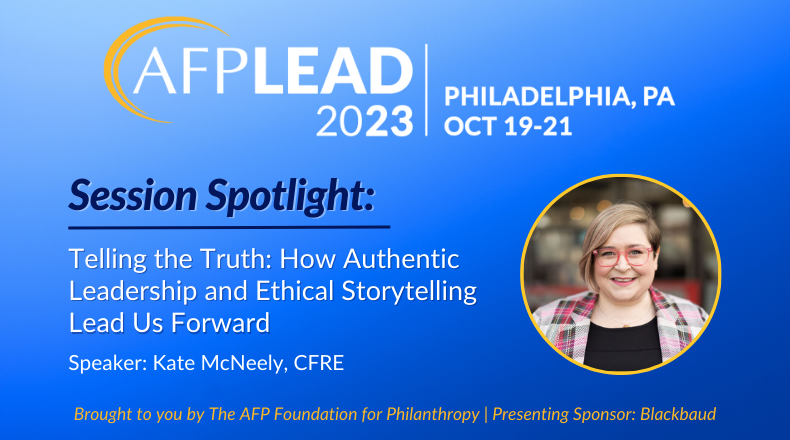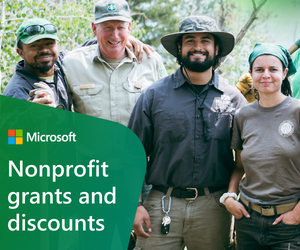The Ethics of Leading with Empathy

In the nonprofit sector, we face ethical dilemmas every day, from our best practices as fundraisers to the ways we uphold or stand against the traditional norms of our work culture. For example, a young nonprofit leader recently confided in me about their struggles to have their contributions and ideas welcomed at work. We talked about how they approached the pitch, their interest in growing as a professional, and how the power dynamics and implicit biases in play made it difficult to insist that they be heard. This push and pull is a constant ethical conversation for those who are growing in their career. As leaders in the profession, we have an obligation to address this dynamic by fostering belonging.
Authentic leadership is more than a trending topic, it’s a culture shift that allows many of us —particularly nonprofit leaders with historically marginalized and underrepresented identities — to claim our strengths in the workplace. It takes both self-awareness (understanding and acceptance of our own story) as well as empathy (understanding and acceptance of the stories of others) to build an empathy-driven approach to the ethics of work culture in your sphere of influence. Through authentic leadership, we can declare that we are living unapologetically in our identities, and issue an invitation to others to do the same.
This Ethics Awareness Month, I invite you to examine the ethics of leadership, and how our support of our colleagues can help create a more welcoming and impact-driven sector for us all. Below are five pathways to inform your ethical leadership approach by practicing empathy and authenticity.
1- Know who you are and how you lead
Your journey toward authentic leadership starts with understanding yourself. How do your identities and experiences shape your work and life? As changes come, are you processing and healing? Do you honor your own values with honesty, transparency, and ethical boundary-setting? And how does this affect the ways you work with your team and the expectations that you hold? In a leadership context, knowing yourself allows you to set an example of self-acceptance and self-care, especially for staff who may have overlapping marginalized identities.
2- Invite your team to be openly and unconditionally themselves
Everyone, from top executives to new hires, has the opportunity to lead with empathy, and how you embrace diversity has the power to create a welcoming environment or sow the seeds of disenfranchisement. A few questions to ask yourself include: How do your team members connect with the mission of your organization — are they in or adjacent to the communities you serve? Do you pause to celebrate the cultures and traditions that your team members share in the workplace? What about the difficult moments? Do you allow them time to process and heal? Does your communication style leave room for feedback and differing perspectives? Do you know where your team members’ strengths and motivations lie? When you celebrate the lived experience of your team, you have the chance to nurture true connection while gaining wisdom and strength in your approach.
3- Practice ethical storytelling
As fundraisers, stories create influence and grounding for our work. We strive to make each donor’s impact on the organization tangible by telling them stories of impact, whether in a donor visit, a board report, an application for funding, or a heartfelt thank-you note. But how do these stories uplift the values of our organizations and our sector? Too often, our stories lean on broken power dynamics and uphold dangerous misconceptions and stereotypes. This puts us at risk of undoing the good we seek to accomplish. Ethical storytelling is a strengths-based model which is rooted in equity and centers the constituent in its process and results. Uplifting the voices of the people we serve — in the way that best serves them — goes hand in hand with authentic leadership to put our ethics into action every day.
4- Cultivate a trauma-informed workplace
It is imperative for leaders to remember that most people have experienced some sort of trauma in their lives, including work-related trauma. This is especially true for people with marginalized identities, such as women of color, queer and trans people, and others whose voices have been systematically excluded from workplace culture in the past. Consider whether you create the conditions that allow your team to heal from trauma. Do you invite (but not demand) honesty and disclosure and make room for healing? Do you accept work-related boundary setting, even if you are not fully aware of the circumstances? Do you highlight your team’s strengths and allow them to make choices for themselves? Whether you work in a trauma-informed environment or not, part of accepting your team for who they are is respecting the impact of their experiences.
5- Transform how you think about fundraising ethics
As fundraisers, we study our ethical codes and standards, ensuring that we are operating in a way that best serves our organization, its beneficiaries, and its donors. But what lies beyond these rules of engagement to shape the way we approach our work? Inclusion, diversity, equity and access (IDEA) —our work to create true belonging — cannot be an afterthought. It is core to any ethical approach to our work.
A holistic approach to ethics brings our lives to bear in our work. When we lead with empathy, tell stories that uplift our beneficiaries, and establish trust and empowerment within all levels of our organization, we can build a movement of collective impact for all.
You can learn more about this topic by attending Kate’s session, Telling the Truth: How Authentic Leadership and Ethical Storytelling Lead Us Forward, at AFP LEAD, October 19-21, 2023, in Philadelphia, PA.
 Kate McNeely (she/her) is a Certified Fund Raising Executive with experience in local, regional, and nationally federated nonprofit organizations in the arts, health care, and human services. Kate serves as the President of AFP, Greater Atlanta Chapter and Director of Development at Georgia Asylum & Immigration Network, an Atlanta-based nonprofit providing free immigration legal services to survivors of crime and persecution. Kate believes in an ethical fundraising model that values impact over influence, and is driven by equity and authenticity. She also believes in giving back, and is a mentor, volunteer, donor, occasional creative, and reluctant amateur graphic designer.
Kate McNeely (she/her) is a Certified Fund Raising Executive with experience in local, regional, and nationally federated nonprofit organizations in the arts, health care, and human services. Kate serves as the President of AFP, Greater Atlanta Chapter and Director of Development at Georgia Asylum & Immigration Network, an Atlanta-based nonprofit providing free immigration legal services to survivors of crime and persecution. Kate believes in an ethical fundraising model that values impact over influence, and is driven by equity and authenticity. She also believes in giving back, and is a mentor, volunteer, donor, occasional creative, and reluctant amateur graphic designer.




